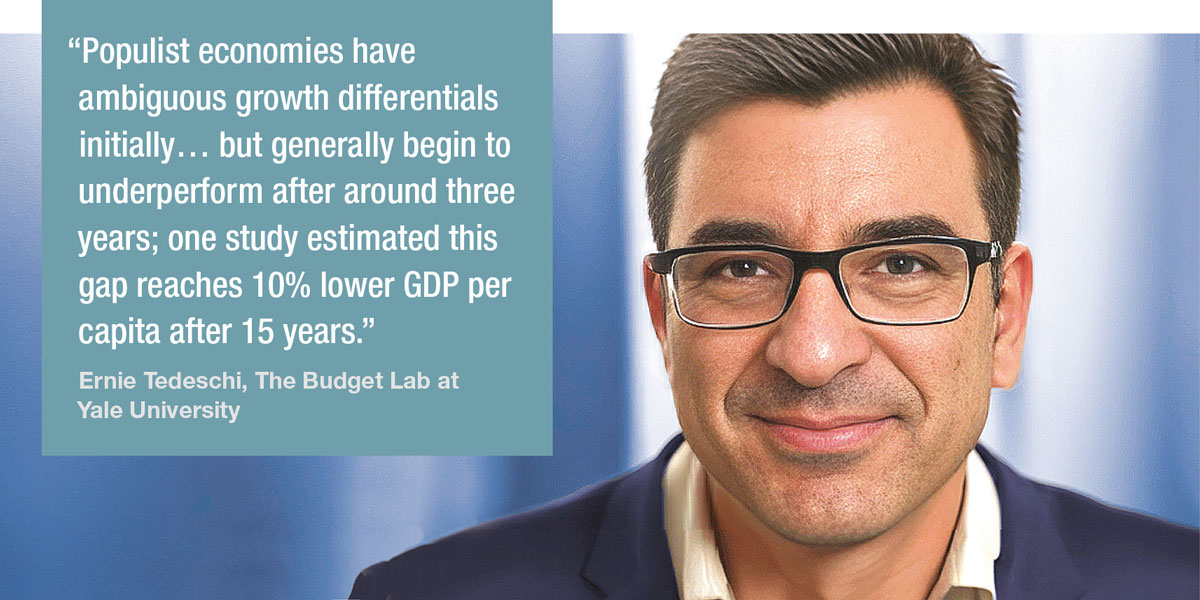US president to oversee financial institution regulation amid deregulation drive.
Executive orders signed by US president, Donald Trump, have given him oversight of all US financial regulation, outside of monetary policy, while also setting a deregulatory agenda.
Academic and economic research suggests that independent institutions can have a direct impact on a country’s economy, however deregulation can be positive for growth.
The first order, entitled ‘Ensuring Accountability for All Agencies’, signed on 18 February 2025, decries the lack of accountability to the President “and through him, to the American people” of “so-called ‘independent regulatory agencies’”.
It also notes that the agencies have been permitted to “promulgate significant regulations without review by the President.”
“These practices undermine such regulatory agencies’ accountability to the American people and prevent a unified and coherent execution of Federal law,” he writes. “For the Federal Government to be truly accountable to the American people, officials who wield vast executive power must be supervised and controlled by the people’s elected President.”
The order imposes presidential supervision and control of the entire executive branch with all executive departments and agencies which includes independent agencies such as the Securities and Exchanges Commission (SEC) and Commodity Futures Trading Commission (CFTC), and the Board of Governors of the Federal Reserve System in connection with its conduct and authority directly related to supervision and regulation of financial institutions.
An SEC spokesperson declined to comment on the new order.
It explicitly notes that “proposed and final significant regulatory actions” will now be subject to review by the Office of Information and Regulatory Affairs (OIRA) within the Executive Office of the President before publication in the Federal Register.
The CFTC was created by the Commodity Futures Trading Commission Act of 1974, and the SEC via the Securities Exchange Act of 1934, and collectively with the Federal Reserve System’s oversight of the US Treasury market, these provide oversight of securities, listed futures, swaps, and municipal and government bond trading, through supervision of exchanges, broker-dealers, alternative trading systems and the Municipal Securities Rulemaking Board.
Monetary policy, as set by the US Federal Reserve System, is explicitly excluded from the order.
In addition to the use of OIRA to filter new regulations, the Director of the Office of Management and Budget (OMB) is tasked with providing guidance on the implementation of the order agency heads, submitting any new regulatory actions under section 3(b) of Executive Order 12866.
“Agency submissions by independent regulatory agencies under such section shall commence within the earlier of 60 days from the date of this order, or completion of such implementation guidance,” the order says.
Regulatory independence
The value of regulatory independence from political supervision is supported across developed markets, with a 2020 working paper from Bank of England and Brown University finding that regulatory and supervisory independence is associated with a significant improvement in financial stability.

“Following a reform that increases independence, banks hold less [sic] non-performing loans,” wrote authors Nicolò Fraccaroli, Rhiannon Sowerbutts and Andrew Whitworth. “This relationship holds for both large and small banks and for different specifications of the baseline model.”
The analysis was made by assessing non-performing loans and the volatility of returns on assets, as measures of bank risk-taking, serves as an alternative proxy of financial instability.

“After a reform increasing independence, bank risk-taking is significantly lower,” they found. “Moreover, we show that the benefit of independence for financial stability does not come at the cost of lower bank efficiency and profitability. Reforms in independence are associated with an improvement in bank efficiency and have no effect on bank profitability. However, we notice that independence leads to a decrease in bank lending, suggesting that more independent agencies might adopt a more stringent approach.”

The independence of regulators and the development of rules can reach beyond the direct impact of regulations on the markets. In his May 2024 paper, “Political Risks to the US Safe Harbor Premium”, Ernie Tedeschi, director of economics for The Budget Lab at Yale, noted that the US could see its economic status eroded by the weakening of pillars which support its ‘safe harbour’ status as an economy. This status increases the investment premium the US can ask for from investors, due to the value that investors place on US safety, soundness and stability.
Two of the six pillars he identifies are ‘independent institutions’ and ‘legal & political stability’.
“The US economy and financial system are underpinned by a credible, politically independent central bank, the Federal Reserve, and a finance ministry staffed by professional civil servants and political appointees with relevant expertise, the Treasury Department,” he wrote. “The US has a relatively fair and equitable legal system and for more than two centuries has held uninterrupted regular elections. Regulators tend to be independent, and the bureaucracy is usually staffed by professionals. US government data, especially economic data, are transparent, highly credible, and widely respected. The military is overseen by civilians and stays largely uninvolved in direct politics.”

If the safe harbour status were to be eroded, this could have a detrimental economic effect, he argued, as a higher US country risk premium increases the cost of capital for financing business investment, overseas investors asking for higher rates of return from US investment and eventually the US economy is reduced, US households become poorer and less wealthy.
“Populist economies have ambiguous growth differentials initially – and in many cases may begin by outperforming their non-populist counterparts financially and economically – but generally begin to underperform after around three years; one study estimated this gap reaches 10% lower GDP per capita after 15 years.”
The channels he cites are a tendency to increase tariffs and cut off immigration, erosion of social trust that may decrease entrepreneurship and increase corruption; and lower transparency leading to lower foreign direct investment in certain sectors.
“The composition of a weaker economy in the US context would depend crucially on the specific drivers of that weakness, but to put the magnitudes in perspective: a 10% fall in the level of US GDP per capita 15 years from now comes to roughly US$27,000 in lost output per household in 2023 dollars. Such weakness would be the equivalent of about a six percentage point increase in the equity risk premium.”
Deregulatory agenda
The second order, initially published as ‘ECEXUTIVE ORDER’ on 19 February 2025, entitled, ‘Ensuring lawful governance and implementing the president’s “Department of Government Efficiency” deregulatory initiative’, announced the rescinding of ‘Unlawful Regulations and Regulations That Undermine the National Interest’.
This order requires agency heads to begin reviewing all regulations subject to their sole or joint jurisdiction for consistency with law and US administration policy, working with team leads assigned from the US Department of Government Efficiency (DOGE) Service Temporary Organization, and the director of the Office of Management and Budget.
They must then identify any rules that they or the Attorney General notes might:
- Be constitutionally difficult;
- Have unlawful delegations of legislative power;
- Are not based on ‘best reading’ of the underlying statutory authority;
- Implicate matters of social, political, or economic significance that are not authorised by clear statutory authority;
- Impose significant costs upon private parties that are not outweighed by public benefits;
- Hurt national interest by impairing a range of issues including technological innovation; economic development; energy production; and foreign policy objectives;
- Regulations that impose undue burdens on small business and impede private enterprise and entrepreneurship.
By mid-April the lists of regulations are expected to be established and passed over for review. The administrator of OIRA will then consult with agency heads to develop a ‘Unified Regulatory Agenda’ that seeks to rescind or modify these regulations, as deemed appropriate.
Agencies are also required to de-prioritise actions enforcing regulations based on anything other than the ‘best reading’ of a statute and de-prioritising actions enforcing regulations that go ‘beyond the powers vested in the Federal Government by the Constitution’, with a review of any ongoing actions.
Analysis by Bank of America suggests a “growth-positive” component can stem from deregulation, via cost cutting and efficiency gains.
“Industries that presumably stand to gain most are those that are most regulated,” wrote its equity and quant strategy team.
However, while this impact reflects a change to operating overheads, those businesses which are already lightly regulated face a similar increase in risk premia to that identified by Tedeschi for nation states.
“These groups: consumer sectors, large banks, commodities sectors, transport and capital goods – trade at steep discounts to reg-lite Tech, TMT and Consumer & Professional Services,” the BofA team writes. “We find a strong inverse relationship between the number of regulations (source: QuantGov) and forward P/E ratios – i.e., more expensive = less regulated.”
©Markets Media Europe 2025
























